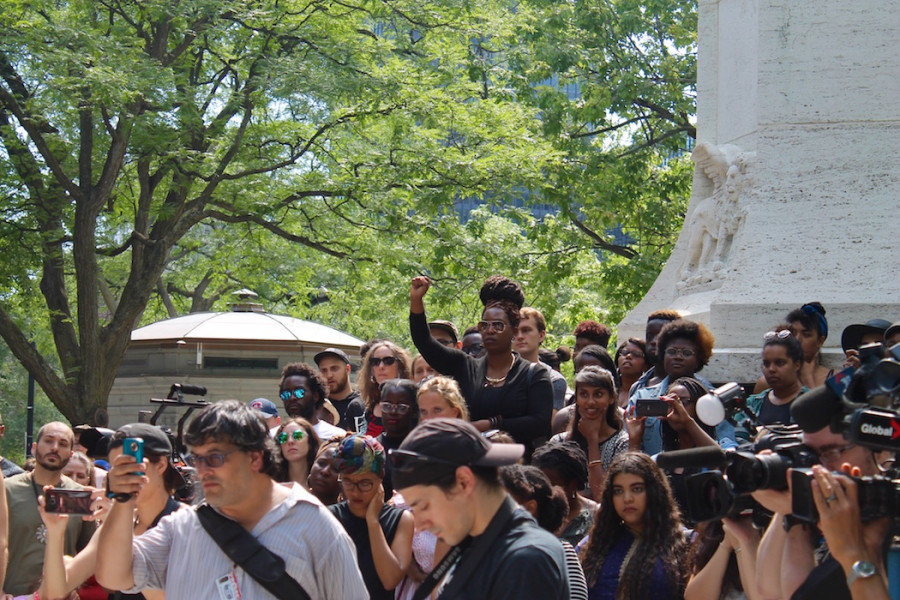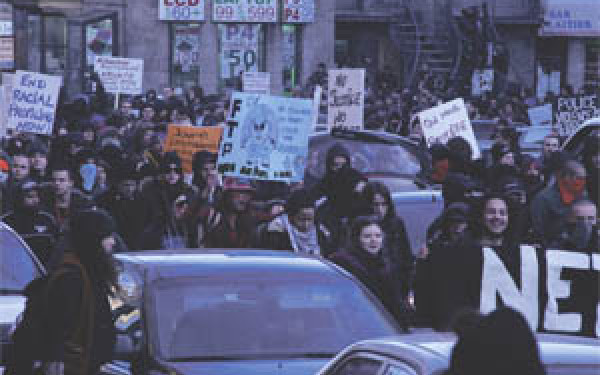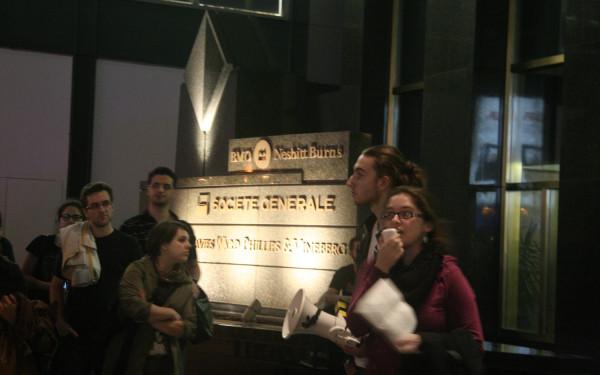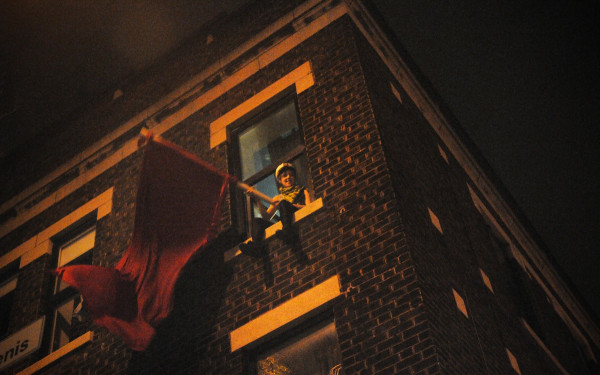Black Lives Matter Gathers in Montreal to ‘Reflect,’ Bring People Together
After recent high profile reports of police killing black men and women in the United States, three women organized a gathering at Cabot Square on Saturday to honour the lives of the lost and express their rejection of police brutality and racism.
The event was organized by Ghionawit Tamir, former President of Concordia’s African Students’ Association; Anne-Sophie Tzeuton, former Vice-President of McGill’s African Students’ Association and Fabiola Mizero Ngirabatware, former President of African Student Association at University of Montreal. It included discussion panels aimed at opening a constructive dialogue, along with poetry and spoken word performances.
“The whole point of a gathering is for people to come together and to really reflect,” said Tamir. “Poetry is a beautiful way of getting your message through. Through rhyme, intonations, it’s really a way for people to get sucked in the message.”
Racism in Canada
“What’s happening in the States is being caught on camera—a new way of proving what we’ve been saying for years and centuries—that violence against black people does happen,” said speaker Daniella Felix.
According to a report from the Office of the Correctional Investigator, black Canadians represent 2.9 per cent of the Canadian population but make up 9.3 per cent of the prison population. One half of those inmates are 30 years of age or younger. Canada’s indigenous communities also face a vastly disproportionate incarceration level, making up 22.8 per cent of the country’s prison population while comprising just four per cent of the general population.
The reasons for this growing trend include poverty, unemployment and underemployment, discrimination in the education system, lack of affordable housing and lack of accessible support.
The report goes on to illustrate how black inmates regularly face unfair stereotypes and judgements about their character.
“We don’t have the blatant KKK marching in the streets and stuff like that, but it’s still here,” attendee Gavin Green said of his own experiences in Canada.
Montreal Shootings
There have been a number of incidents in recent years in which police officers have been accused of using excessive force on members of Montreal’s black community.
These include the deaths of Jean-Pierre Bony and Fredy Villanueva committed by the Service de police de la Ville de Montréal.
According to concerned citizens’ group, La Coalition contre la Répression et les Abus Policiers, “More than 50 people, most of whom were marginalized, have been killed in police operations in Quebec since 2005.
Nydia Dauphin is an active member of Montreal Noir, a collective of Montreal citizens concerned about police brutality towards black communities. She says their work started after Jean-Pierre Bony was shot during a drug bust in Montreal North earlier this year. He later died from the injuries he sustained.
Quebec’s independent investigation unit finally launched this summer with the aim of keeping law enforcement accountable. First criticized by Quebec’s Human Rights Commission over its long delays, it is now facing criticism for its lack of diversity.
To those who would argue that anti-black racism is more prevalent in the US, Dauphin replied, “We have this right here in Canada too. As a black person, you live micro-aggressions on a daily basis.”
Tamir added, “Canada really puts itself forth as a very multi-ethnic and multicultural kind of country, which is true, but we have to mindful of, do we really respect these cultures? Do we really give them space?”
Message to Allies
The event was promoted as a gathering, not a street demonstration, because the organizers wanted to bring people together and encourage conversation about the institutionalized racism faced by the black community.
“I want everyone here to walk away not fuelling this fight with hatred, but fuelling this fight with love,” said Rayana Speede, a spoken word artist.
Daniella Felix believes that critics of the movement may still come around: “Explain to them that it’s not a race war. It’s about preserving the right of freedom to live in a society where we don’t feel marginalized,” she said.
One of the major themes of the gathering was to encourage non-black allies to speak up about the racism they witness in their own lives. Organizer Anne-Sophie Tzeuton stressed the importance of intersectionality. Gender, race, ability, and class cannot be understood in isolation from one another.
“What should allies do? Use your privilege to educate others. Create a platform to share your work in solidarity and learn from others,” she explained.
Above all, she said, an ally must not pretend to be colorblind. “You should see colour. We’re all different and I believe there is beauty in difference. We should accept and celebrate our differences,” Tzeuton added.
There has been a backlash against the phrase “Black Lives Matter.” Critics of the movement claim to feel excluded, and reply with the phrase replying “All lives matter.”
Tzeuton argued that the rebuttal misses the point.
“It’s a bit of a slap in the face of what we’re trying to do. Black Lives Matter doesn’t mean that other lives don’t matter,” she said. “It just means that we’ve been going through this for 500 years. Enough is enough.”
Speaker Venetta Solena Gordon emphasized that Black Lives Matter is not meant to be divisive. “All lives do matter, but right now, we as black people are in danger,” she said. “That’s why we stress the need for everyone to understand that Black Lives Matter. Yes, I live in Canada. Yes, I live in Montreal. But it touches me personally. My brother could be the one shot in the States. My sister could be shot in the U.K. My father could be shot here in Montreal.”
The video below shows footage from the Black Lives Matter demonstration that took place on Wednesday, July 13, 2016.
—Video by Matt D’Amours

_900_600_90.jpg)

_900_600_90.jpg)
_900_600_90.jpg)
_900_600_90.jpg)


__600_375_90_s_c1.jpg)


